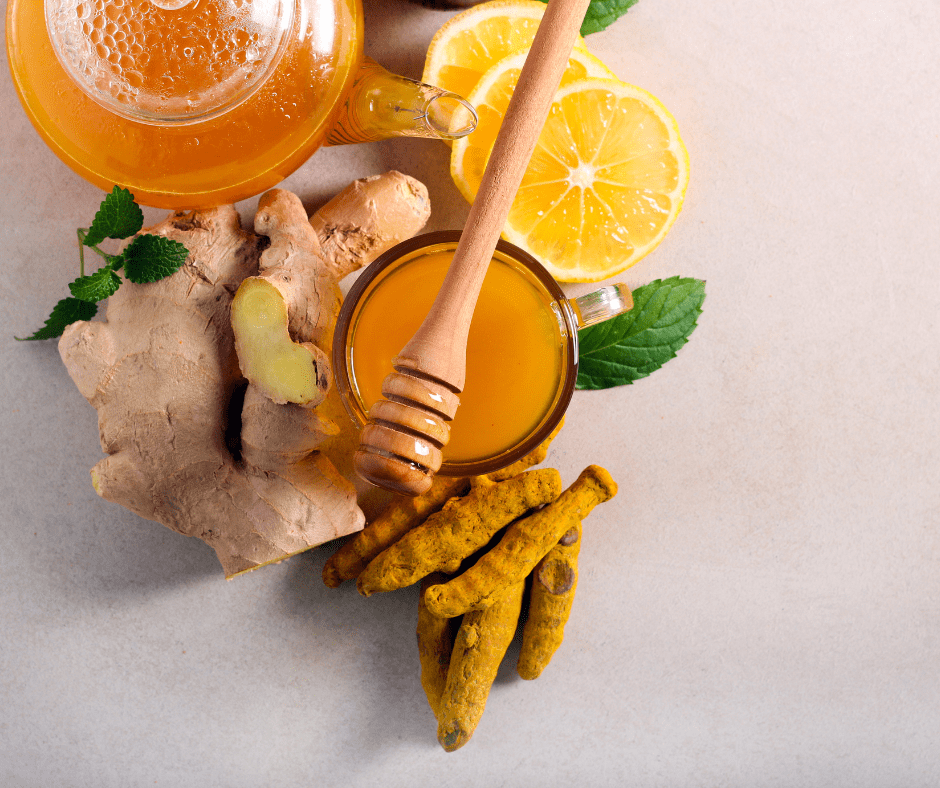
Health Benefits of Turmeric, Ashwagandha, Ginger & Honey
The article is only for the general informations. It should not be used as advise of any kind.
Besides the flavor and versatility, turmeric, ashwagandha, ginger, and honey have a vast array of health benefits. Let’s break down the research.
Health Benefits of Turmeric
Turmeric is an aromatic and warm flavored spice with many known health benefits. For example, turmeric has demonstrated anti-inflammatory and antioxidant properties (Jiang, 2019). In addition, studies have shown that turmeric has vast benefits ranging from improving heart, gut, and brain health to helping control blood sugar and even weight!
Health Benefits of Ashwagandha
Ashwagandha is an earthy spice from an evergreen shrub. It contains chemicals that may help reduce inflammation, lower blood pressure, and boost immunity (National Library of Medicine & U.S. Department of Health and Human Services, 2021). In addition, the Natural Medicine Comprehensive Database rated ashwagandha as possibly effective for stress and insomnia.
Health Benefits of Ginger
Ginger is a commonly used spice, especially for nausea and motion sickness. However, it has many other health benefits as well. For example, ginger contains a natural compound called gingerol, which helps food move along the gastrointestinal tract, relieving gas, bloating, and constipation (Slattery, n.d.).
Health Benefits of Honey
Syrupy, sweet, and sticky honey is the perfect addition to desserts, beverages, and more! According to the Mayo Clinic (2020), there is evidence that honey can reduce the risk of heart disease, including heart attack and stroke. Also, studies show that honey can ease coughs, lessen symptoms of gastrointestinal disease, and provide benefits against neurological disorders, such as anxiety and depression.
A Delicious (and Nutritious) Combo
Altogether, not only are these flavorful spices a delicious addition to sweet honey, but there are many health benefits to reap from the combination of turmeric, ashwagandha, and ginger as well.

References:
Jiang T. A. (2019). Health Benefits of Culinary Herbs and Spices. Journal of AOAC International, 102(2), 395–411. https://doi.org/10.5740/jaoacint.18-0418
Mayo Foundation for Medical Education and Research. (2020, November 14). Honey. Mayo Clinic. Retrieved May 14, 2022, from https://www.mayoclinic.org/drugs-supplements-honey/art-20363819
Slattery, E. (2022, March 8). Ginger benefits. Johns Hopkins Medicine. Retrieved May 14, 2022, from https://www.hopkinsmedicine.org/health/wellness-and-prevention/ginger-benefits
U.S. National Library of Medicine. (n.d.). Ashwagandha: Medlineplus supplements. MedlinePlus. Retrieved May 14, 2022, from https://medlineplus.gov/druginfo/natural/953.html
This statement has not been evaluated by the Food and Drug Administration. This product is not intended to diagnose, treat, cure, or prevent any disease